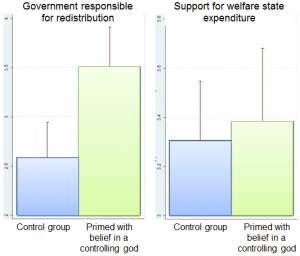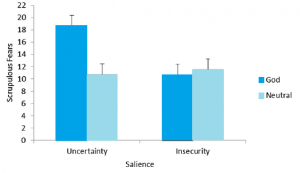There’s an enduring puzzle about religion and government, and it’s about what effect religions have on government welfare policies. That’s down to an intriguing observation: that more religious countries tend to have a weaker welfare state.
Quite why this is so is a matter of dispute. After all, given religion’s association with altruism, you might expect that religion to encourage people to be in favour of having the state give a helping hand.
One possibility is that if people feel like god is in control, they feel less need for a social safety net. It’s an intriguing idea that finds some support in research showing that support for strong government and belief in a controlling god tend to exclude each other. Manipulate people’s belief in a controlling god and their support for strong government goes down – and vice versa.
Gilad Be’ery and Pazit Ben-Nun Bloom, of the Hebrew University of Jerusalem, tested this idea on a group of American Catholics they recruited over the internet using Amazon’s Mechanical Turk.
The set-up was simple. The participants were split into two groups, and the first group were asked to what extent they agreed with a series of three questions about a controlling god (e.g. “God, or some type of supreme being, is in control, at least in part, of the events within our universe”. The idea of these was to get them thinking about god as being in control.
The second group acted as the control. They were asked the same questions, but only at the end of the experiment. So they were not primed with thoughts about a controlling god.
 Then they asked the participants two questions. Should the government take measures to reduce differences in income levels? And would they would like the government to spend more or less on each of four areas of welfare (bearing in mind that they might have to pay more tax to cover it).
Then they asked the participants two questions. Should the government take measures to reduce differences in income levels? And would they would like the government to spend more or less on each of four areas of welfare (bearing in mind that they might have to pay more tax to cover it).
What they found, surprisingly, was that priming these Catholics with thoughts about a controlling god actually increased their support for government wealth redistribute and spending on welfare.
The researchers did similar experiments with American and Israeli jews, with similar results. So it seems like a fairly robust finding.
What they suspect is happening here is that belief in a controlling god actually makes people feel like they are less in control of their own lives. And it’s known that when people feel less in control, they’re more in favour of social safety nets.
Still, this does stand in direct contrast to earlier research suggesting that belief in a controlling god reduces support for a strong government.
And it doesn’t explain why countries with more religion have weaker welfare states.
For that, we have to look to different causes. I covered a few of them back in 2008 – but the on I’d particularly like to draw out is that religious affiliation provides a sort of private social security system. Among certain religious groups (Evangelical Christians being one), most charitable donations go directly to co-religionists. And support for government welfare is, unsurprisingly, lowest in this groups.
Catholics and Jews are the least likely to link charitable donations to their own religion. Which is, perhaps, why they are more keen on the government giving a helping hand.
![]() Be’ery G, & Ben-Nun Bloom P (2015). God and the Welfare State – Substitutes or Complements? An Experimental Test of the Effect of Belief in God’s Control. PloS one, 10 (6) PMID: 26061050
Be’ery G, & Ben-Nun Bloom P (2015). God and the Welfare State – Substitutes or Complements? An Experimental Test of the Effect of Belief in God’s Control. PloS one, 10 (6) PMID: 26061050















